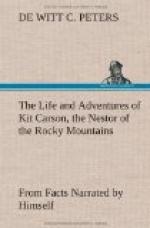the greater part of the day. Finally, as Gen.
Kearney and his men were approaching the water, where
they, intended to camp, and were not over five hundred
yards from it, down came the Mexicans, divided into
two separate commands, for the purpose of making a
charge. They were at first warmly received by
the Americans, who, after a time, were obliged to
give way to superior numbers; but, in doing so, they
retreated in good order to a hill about two hundred
yards to their left. Here they halted and determined
to decide the battle; but the wary Mexicans, on seeing
the strength of the position taken by their foes,
declined to attack them and drew off to a neighboring
height, from which they commenced and maintained a
deadly fire on the Americans. Captains Emery and
Turner, with all the available dragoons, were sent
to dislodge them. This they did in splendid style,
after a sharp encounter, and when their companions
saw them take possession of this position, General
Kearney, with all his wounded and luggage trains,
joined them there. Here a permanent resting-place,
for the time being, was made. In fact, the men
had no other choice, as they were now pretty effectually
used up from fighting, severe loss and fatigue.
The Americans found on this hill water barely sufficient
for their own use, and were obliged to exclude the
idea of sharing it with their animals. Although
within sight of abundance of this much-needed article,
yet they did not dare to drive the latter to it, for
they were too weak to defend them from the assaults
of the enemy. The situation of Gen. Kearney’s
force was now critical in the extreme; as, besides
the dangers that surrounded him, the men were reduced
to living on their mules. That afternoon another
council of war was called, at which desperate efforts
to be made for immediate relief were discussed.
When every spark of hope had almost died within them,
and when they were in a dilemma as to what still remained
for them to do, Kit Carson was found to act as the
reader has previously seen him act to parties almost
similarly situated—the right man in the
right place. Rising to his feet, he addressed
a few simple words to those present, saying that he
was willing to make the attempt of creeping through
the Mexican lines. Should he succeed, he pledged
his word that he could carry information to Commodore
Stockton at San Diego, and thus bring them succor.
No sooner had he made this proposition than he was
seconded by Lieutenant Beale, then of the United States
Navy, who, equally as brave and daring as Kit Carson,
volunteered his services in the undertaking.
This gentleman, since the time he first turned landsman up to the present date, has been adding fresh laurels to his fame. His recent career in exploring new routes across the great western girdle of prairies and mountains is so well known through his valuable and interesting reports as not to require recapitulation at our hands. His life has been one series of rare adventures; while, to the scientific world, he has proved a valuable acquisition. To the United States Government his services are inestimable; and, as an explorer, he has but few equals.




